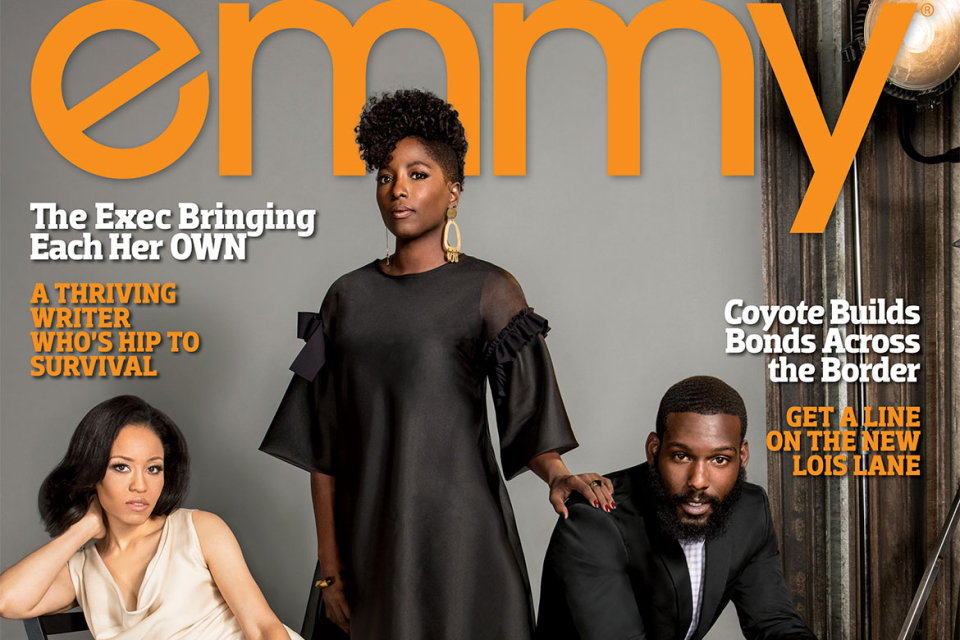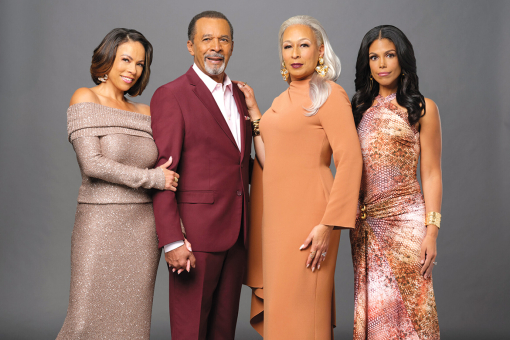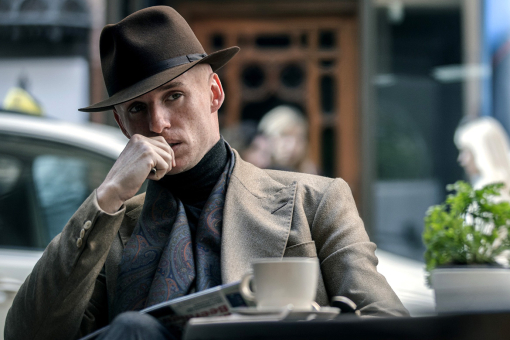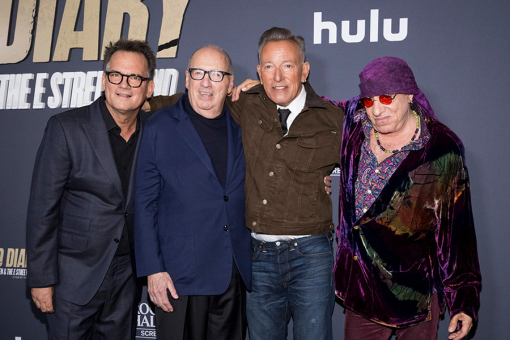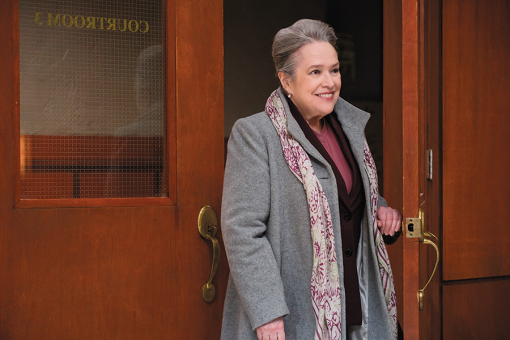Oprah Winfrey knew.
From the moment she read Queen Sugar, a novel about a Louisiana family, she knew it would make a terrific series. She knew Ava DuVernay should be its creator. And she knew if people just watched, they would share her passion for these characters and their world.
Now in its fifth season on OWN — and renewed for a sixth — the compelling drama brims with characters who seep into your consciousness. Queen Sugar has long attracted fans who rave that it is one of the best hours on television. Yet when conversations arise about the tangled threads of family television dramas, this series doesn't receive the accolades and attention it deserves.
Black Twitter, Winfrey notes, appreciates Queen Sugar. "I love this show so much," Winfrey says during a Zoom video call. "And it has been one of the great sadnesses for me that I haven't been able to amplify it to the level that other people can see what a beautiful, family-uniting, soulful, connected piece of work it is."
"It has never been given a second look by the prestige spaces in our industry," DuVernay acknowledges. "That doesn't bother me. I think it is outside of their abilities to understand the nuance, the care, the beauty of this Black family unadorned by anything other than familial love. It is Black people without a shoot-'em-up, laugh track and magical powers."
The show's themes and appeal are universal, but "the wrapping is Black,"DuVernay says.
"And that," she continues, "is where the core of the conversation, or the lack of conversation, lies — and the part of the story most people don't talk about. You have a show that is about a family — undeniably and proudly Black — and to enter it, you have to be willing to sit and watch and enter into their lives.
"And the bottom line is: how many people watch shows about people who are not like them? That is the question, and we know the answer to it, I think. We have fans who are not Black, but not enough to move the needle."
The series chronicles the Bordelon family, which consists of three siblings — Nova, Ralph Angel and Charley — plus family matriarch Violet and their partners and children.
Like all families, they're messy and complicated, loving and accepting. The Bordelons weather storms, and farming on the bayou means that hurricanes, physical and emotional, blow through, razing all in their path. Then they rebuild, together, because that is what family does.
"It is a very realistic look at the value of family," says Peter Roth, former Warner Bros. Television Group chairman, who recently partnered with DuVernay to launch ARRAY Crew, a database of underrepresented below-the-line talent.
"I relate to them as if they were my own family, and they could not be more different than mine." Roth and his wife of 47 years liken themselves to Aunt Vi and her husband, Hollywood — sweetly proving just how universal the show is. Violet, played by Tina Lifford, is a wise, loving woman who has a past she overcame and a present any right-thinking person would relish.
"We haven't really seen this woman on television before," Lifford says. "Vi is this kind of archetypical character. Everybody has that auntie in their life who is this rock and at the same time someone they can talk to, often more easily than their own parents. She is totally rendered, 360 degrees of a full human being, sexual and interesting and full of emotions. She is not this frumpy, irrelevant sidebar."
Vi and Hollywood (Omar J. Dorsey) appreciate and genuinely enjoy each other. Early on, their age difference was mentioned (she's older). He shrugged, and they got on with the business of living — well.
"I think it is the best relationship probably in television history," Dorsey says. "Hollywood is that salt-of-the-earth human being. I have only met one person in my life like Hollywood, and that's my mother."
While Dorsey maintains he's not as good as Hollywood, DuVernay saw those qualities in him and offered the part, no audition needed. Granted, that's not the usual path to a role, but much of this series came about in atypical ways.
Winfrey, who had read Natalie Baszile's debut novel, Queen Sugar, worked with DuVernay on her 2014 feature, Selma. When the film wrapped, she invited DuVernay to her Maui home to decompress.
"I had placed the book in different places around the house," Winfrey says, laughing at the memory. "I'd have it in the kitchen. I had it by her bedside. I had it in the living room where we all sat; it would just be on a little table. And as often is the case when I love a book, I start talking about it, talking about it, talking about it.
"She couldn't hear it at first. She was like, 'What? What's it about? A sugar plantation in New Orleans?' And I was practically dancing on my head. 'I am telling you it is really good!'"
Then DuVernay read it. On the plane ride home, she wrote her first draft. Winfrey liked it but didn't love it. She knew the stumbling block: DuVernay was hewing too close to the novel. By the third rewrite, DuVernay had gold. Retaining the book's essence, she made substantial changes, altering some characters and adding a new one, Nova.
More changes lay ahead. Season five had been written and the first episode completed when the pandemic shuttered production. As police violence against Blacks drove protesters into the streets and Covid ravaged the African-American community, DuVernay felt a responsibility to incorporate all of it.
"It felt disingenuous to continue with the same story with the country, the world, the Black community going through such a singular time," she says.
On a conference call with Roth, Winfrey and OWN president Tina Perry, DuVernay presented her bold plan for redoing the season. The action would now begin in February 2020, when the virus was starting to make news, move on to the killings of Breonna Taylor and George Floyd, then address the Black Lives Matter movement and end on Election Day, placing the Bordelons squarely in this fraught time.
DuVernay developed a new story outline for the season, and then she and showrunner Anthony Sparks rewrote each script.
"If we could combine the safety protocols we needed to implement, with a head-on incorporation of the pandemic, the racial reckoning and the election, Queen Sugar was the perfect show to do that," Sparks says.
"We felt we had to do our best to have our characters live in this representative moment as much as possible. It could not be ignored or brushed aside or explained away. We also had to do it in a way that created a safe environment for our cast and crew."
To accomplish that required innovative thinking and a highly organized plan. The job fell to Paul Garnes, an executive producer of Queen Sugar and head of physical production at ARRAY Filmworks. The show took over a small hotel in New Orleans. Shoots were tightly scheduled, and Garnes devised contingency plans in case anyone took ill.
"Actors would test and then go into the hotel for 14 days, and during that 14 days, we would test along the way," he explains. "We would bring them everything. We had a staff of hotel people in our testing regimen. We had a staff of PAs to bring in food and take care of laundry. We put together a gym and gave them their own space. They didn't have to worry about other guests once they got there."
The actors felt taken care of, living in the hotel and shooting in pods comprising their onscreen nuclear families.
"How do we tell stories with the same level of excellence, the same level of joy, the same level of commitment to true and dimensional characters?" asks Dawn-Lyen Gardner, who plays Charley. "And make sure we are taking the best care possible of ourselves as we can?
"All of that takes a certain kind of energy. It takes its own heroic effort, so I appreciate deeply how much energy and time and money and thought went into creating as safe an environment as absolutely possible."
Her character, the middle sibling, is the child of a complicated, charismatic mother (Sharon Lawrence) and the beloved father (Glynn Turman) who died in the pilot but whose profound influence on his family remains.
Polished, strategic and smart, Charley saw her basketball-star husband embroiled in a sex scandal in the first season. She and their son, Micah (Nicholas L. Ashe), moved from their L.A. mansion to the farm her father owned. Charley has thrived, becoming the first Black woman owner of a sugar mill and winning election to the city council while standing up to racism and corruption. ...
For the rest of the story, pick up a copy of the latest emmy magazine HERE.
This article originally appeared in emmy magazine, Issue No. 2, 2021
For a look behind the scenes of our cover shoot, click HERE

